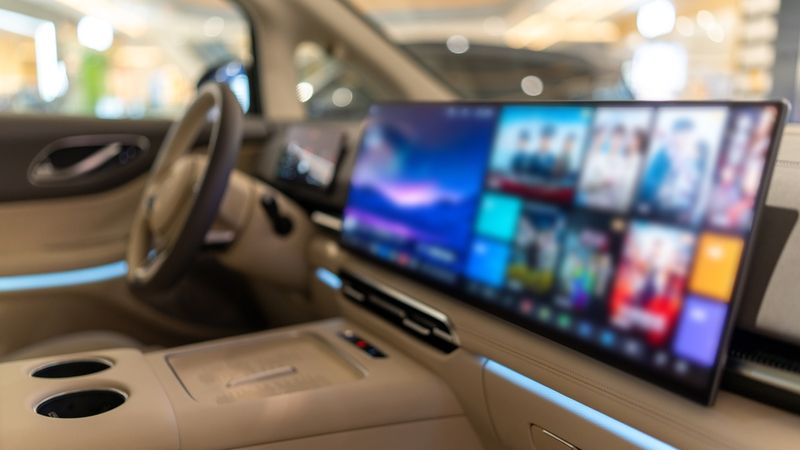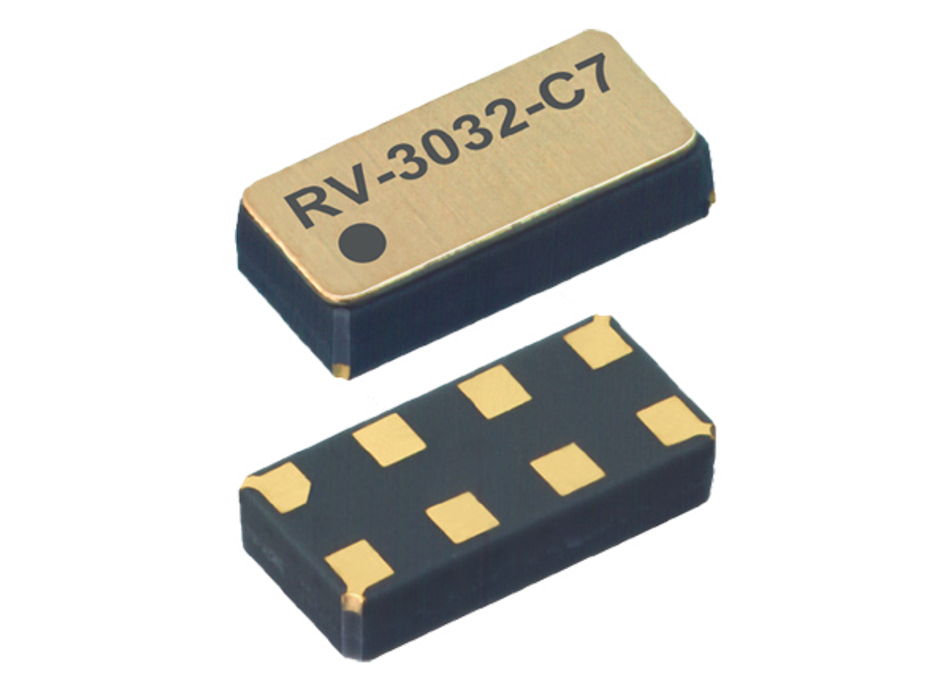Key Usage of RTC Modules in Automotive Infotainment Control Systems
This article explores the key benefits of RTC modules in automotive infotainment control systems, highlighting how Micro Crystal's RTC solutions contribute to enhanced performance and user experience.
Automotive infotainment control systems are integrated platforms that manage in-car entertainment, navigation, and communication functions and provide drivers and passengers with an interactive experience through touchscreens, voice commands, and physical controls. Modern automotive infotainment systems integrate advanced functionalities that enhance the driving experience. These systems require precise timekeeping for synchronization across various features such as GPS navigation, media playback, and vehicle diagnostics. In this regard, Real-Time Clock (RTC) modules play a crucial role in maintaining accurate timekeeping for the smooth operation of these features. This article explores the key benefits of RTC modules in automotive infotainment control systems, highlighting how Micro Crystal's RTC solutions contribute to enhanced performance and user experience.
Built-in Crystal for Precision
RTC modules with built-in crystals ensure precise and reliable timekeeping in automotive infotainment systems. An integrated crystal provides a self-contained, highly stable timing solution that is specifically designed to oscillate at a fixed frequency, which is ideal for accurate timekeeping applications. RTC modules with built-in crystals simplify system design as they do not need unnecessary exterior components, reducing both board space and potential points of failure.
In automotive applications, temperature variations, vibrations, and electromagnetic interference can affect the performance of externally connected components. RTC modules like Micro Crystal's RV-3032-C7, which feature a built-in crystal and an embedded temperature sensor, offer enhanced resilience and accuracy across such challenging environments. The RV-3032-C7 is temperature-compensated over the typical automotive range of -40°C to +85°C, ensuring exceptional stability that also translates to its extreme accuracy of ±0.2 seconds per day throughout this temperature range. Such reliability and accuracy are essential for infotainment systems that require precise timing for functions such as media playback synchronization, scheduling, and event logging.
Importance of RTCs for Automotive GPS Systems
In automotive infotainment systems, rapid and accurate GPS synchronization is essential for navigation. RTC modules maintain precise timekeeping, which directly impacts how quickly and efficiently a GPS receiver can acquire satellite signals. When a GPS receiver is powered on, it needs to synchronize with satellites to determine its position. This process, known as time-to-first-fix (TTFF), depends on accurate time information. Without an RTC module, the receiver must perform a cold start, scanning a broad range of time and frequency data to locate satellites, increasing the delay before it can provide a position fix. The RTC assists the GPS receiver in acquiring satellite signals more efficiently by providing an initial time estimate, reducing the time required for synchronization.
Moreover, GPS receivers rely on ephemeris and almanac data, which is information about satellite positions and orbits, to refine their location calculations. RTC modules aid in retrieving and decoding this data by maintaining accurate timing, ensuring a smooth start-up process.
RTC modules also enhance overall GPS performance by maintaining time continuity. If a vehicle temporarily loses satellite connectivity, like when driving through tunnels or urban environments with signal obstructions, an RTC helps the system maintain its internal clock. This minimizes disruptions and allows the GPS receiver to quickly reacquire satellite signals once they become available again.
Another advantage of integrating RTC modules into GPS-equipped infotainment systems is improved positioning accuracy. GPS receivers calculate location based on the precise timing of satellite signals, and any deviation in timekeeping can lead to errors in position estimation. RTC modules help eliminate these inaccuracies by providing stable and reliable time references. Moreover, quick synchronization contributes to optimizing power efficiency as the faster a GPS receiver can acquire its position, the less energy it consumes during start-up and operation, leading to better overall system performance.
Advanced RTC solutions, such as the Micro Crystal's RV-3032-C7 and RV-8803-C7, are particularly well-suited for automotive applications due to their high accuracy and low power consumption. These characteristics ensure stable and efficient timekeeping under varying environmental conditions.
Integration with Automotive Systems
RTC modules are integrated into automotive infotainment control systems, acting as reliable timekeeping units that allow various subsystems to operate in harmony. RTC modules enable consistent scheduling and coordination across key functionalities by maintaining accurate, autonomous time. For example, infotainment systems rely on synchronized timing for functions like timed diagnostics, user preferences, scheduled software updates, and user data management. RTC modules ensure that these time-sensitive processes can continue even when the vehicle is powered down or disconnected from the network, preserving consistency upon the next start-up.
Another crucial aspect of RTC integration is compatibility. All RTC modules from Micro Crystal are automotive-grade and AEC-Q200 qualified, facilitating smooth integration with a wide range of automotive components and embedded software platforms. This includes integration with real-time operating systems (RTOS) and microcontroller-based architectures commonly used in vehicle electronics, where the RTC module communicates via standard interfaces like I²C or SPI. These microcontrollers, in turn, may interface with in-vehicle communication systems such as CAN or LIN buses. The RV-3032-C7 also offers features like programmable alarms, timers, and clock output functions that support more advanced system coordination.
Enhanced User Experience
RTC modules enhance the overall user experience in automotive infotainment. RTC modules ensure the smooth functionality of the system without requiring constant input or correction from the user. They assist in various applications, including automatically switching between radio programs, displaying the correct time on the dashboard, and ensuring alarms and reminders trigger precisely when needed.
For instance, in media playback systems, precise timekeeping allows the infotainment unit to resume playback at the exact point where it left off, even after the vehicle has been powered down. This synchronization extends to other integrated components as well, such as voice-activated systems and connected smartphones, to improve responsiveness and coordination.
Moreover, as RTC modules like the RV-3032-C7 from Micro Crystal, with their ultra-low power consumption and built-in crystal and temperature compensation, allow the functionality of infotainment systems during standby or low-power modes, in the long run, it not only minimizes the need for frequent recalibration or battery replacement but also supports long-term reliability and convenience for the end-user.
Conclusion
The role of RTC modules in infotainment systems is vital to ensure accurate and reliable timekeeping for various applications. Micro Crystal's portfolio of RTC modules, including the RV-3032-C7 and RV-8803-C7, offers exceptional precision, low power consumption, and smooth integration with automotive systems. They deliver accurate and precise timekeeping, support power efficiency, and enable synchronized communication, all of which are essential for ensuring the efficiency and reliability of automotive infotainment systems. Micro Crystal's RTC solutions help automotive manufacturers enhance the performance, reliability, and user experience of their infotainment control systems for a more connected and efficient driving experience.
Engineers and developers seeking to enhance the reliability of their infotainment control systems by utilizing advanced RTC solutions can visit Micro Crystal's website or contact their team to learn more about cutting-edge RTC solutions.
References
Micro Crystal. [Online] Available at: https://www.microcrystal.com/en/ (Accessed on January 2, 2025)
RV-3032-C7 [Online] Available at: https://www.microcrystal.com/en/products/real-time-clock-rtc-modules/rv-3032-c7 (Accessed on January 2, 2025)
RV-8803-C7 [Online] Available at: https://www.microcrystal.com/en/products/real-time-clock-rtc-modules/rv-8803-c7 (Accessed on January 2, 2025)


